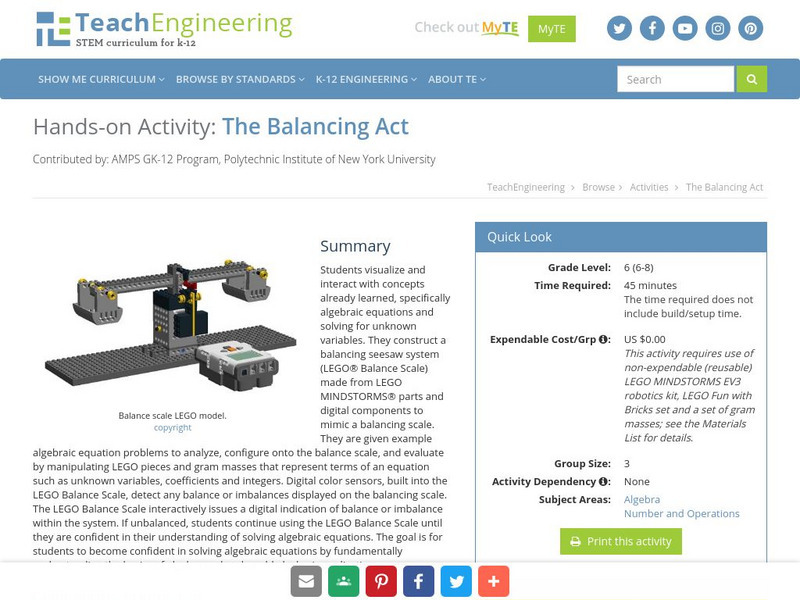Curated OER
Graph the Density of Fruit
Fifth graders review the definition of mass and volume. They calculate and graph the density of various types of fruit while working in groups on a spreadsheet program. They look at how size of the fruit can be similar but the weight is...
Curated OER
A World Of Matter
First graders complete a variety of experiments with solids, liquids and gases. They read books about matter, identify the characteristics of solids, liquids and gases and the sort and classify a variety of matter. Students make...
Curated OER
DC Metrology
In this physics learning exercise, students complete 11 short answer questions related to general metrology. They define basic metrological terms.
Curated OER
Comparing Apples and Onions
Fifth graders observe and compare apples. In this apples activity, 5th graders work in groups to record the physical characteristics of a variety of apples. Students predict each apples weight and then weigh them to see if they were...
Curated OER
Estimating Errors in Chemistry
Estimating Errors in Chemistry is a detailed handout that illustrates the importance of calculating the percent error when working in the chemistry lab. There are no actual problems to solve, just notes and examples of calculations. Hand...
Curated OER
Bathtub Physics - Density, Buoyancy and Flotation
High schoolers study Archimedes' Principle, flotation and the reaction of buoyant forces and explain the relationship between density and flotation.
Curated OER
Changes in the Copper Penny
Third graders explore the difference between a physical change in a substance and a chemical change. students study the volume, density, altering shape and chemistry of a copper penny.
Curated OER
Fast Cars and Roll-Over
Students creat a ramp using cardboard and tape. They follow directions to perform an experiment to determine the degree of tilt needed to cause an empty milk carton to tip over. Students discuss their results in terms of center of gravity.
Curated OER
Barge Building: What Floats Your Boat?
Students construct aluminum foil boats that float while holding the greatest number of pennies. They investigate the concept of water displacement, record their results, and watch a Bill Nye video on buoyancy.
Curated OER
Measuring and Comparing Weight and Capacity
First graders measure weight and capacity. In this measurement activity, 1st graders explore visual examples of weight and capacity comparisons. Students also practice solving problems that their instructors model.
Curated OER
Strength in Size? Madagascar Cockroach Pulls
Fourth graders conduct an experiment involving size and relative ability in smaller species using Madagascar cockroaches. They make predictions about how many pennies the roaches can pull, compare the results to human strength, and...
Curated OER
More Bait for Your Buck!
Learners determine where to buy the heaviest earthworms as they study invertebrates. They create a double bar graph of the results of the weight data.
Curated OER
Density and Buoyancy Lesson Plan
High schoolers investigate why some objects float or sink in water. In this physics lesson, students calculate the density of clay ball using a mathematical equation. They write a complete lab report about the experiment.
Curated OER
Causal Patterns in Density Phenomena
Students realize that density exists. They develop a mental model of density-to realize that something is going on that they cannot see to account for differences between materials.
Curated OER
Inventions 2: The Impact
Students research inventors and inventions and their impacts. In this invention lesson, students research inventions and their affects in good and bad ways.
TeachEngineering
Teach Engineering: The Balancing Act
Students are given the opportunity to visualize and interact with concepts they have already learned, specifically algebraic equations and solving for unknown variables. Students construct a balancing seesaw system (LEGO Balance Scale)...
University of Colorado
University of Colorado: Ph Et Interactive Simulations: Balancing Chemical Equations
An interactive simulation with weights and scales that teaches about balancing chemical equations and conservation of mass. This simulation can either be downloaded or played online and includes handouts, lesson plans, and additional...
University of California
Ucla K 6 Physics/astronomy: Mass, Weight, and Density
This website provides explanations of mass, weight, and density with directions for building simple scales and balances. Provided as encouragement to teach these concepts to young children, it offers a good review for older students.
SMART Technologies
Smart: May the Forces of Push and Pull Be With You!
Read, brainstorm, drag objects, erase to reveal answers, and move weights on a balance scale to learn about forces, mass, gravity, weight, and balance in this activity created by SMART.
NASA
Nasa: Space Place: Messenger: Planet Mass Comparison
Compare the masses of planets in this interactive animation. Simply pile a number of Earths on one side of the scale, to balance with the mass of one Jupiter. Then try this with all the planets.
TeachEngineering
Teach Engineering: Mechanics Mania
Through ten lessons and numerous activities, students explore the natural universal rules engineers and physicists use to understand how things move and stay still. Together, these rules are called "mechanics." The study of mechanics is...




















